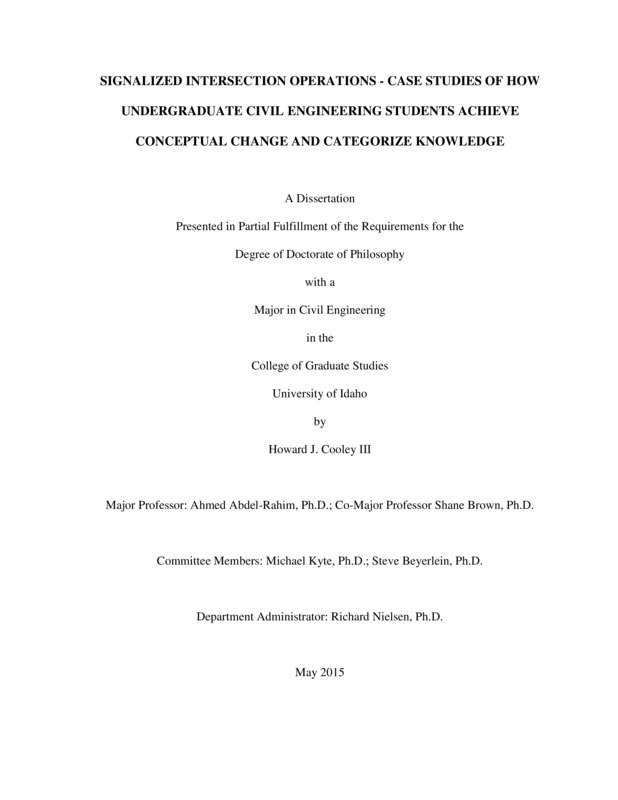SIGNALIZED INTERSECTION OPERATIONS - CASE STUDIES OF HOW UNDERGRADUATE CIVIL ENGINEERING STUDENTS ACHIEVE CONCEPTUAL CHANGE AND CATEGORIZE KNOWLEDGE
Cooley, Howard J.. (2015). SIGNALIZED INTERSECTION OPERATIONS - CASE STUDIES OF HOW UNDERGRADUATE CIVIL ENGINEERING STUDENTS ACHIEVE CONCEPTUAL CHANGE AND CATEGORIZE KNOWLEDGE. Theses and Dissertations Collection, University of Idaho Library Digital Collections. https://www.lib.uidaho.edu/digital/etd/items/cooley_idaho_0089e_10587.html
- Title:
- SIGNALIZED INTERSECTION OPERATIONS - CASE STUDIES OF HOW UNDERGRADUATE CIVIL ENGINEERING STUDENTS ACHIEVE CONCEPTUAL CHANGE AND CATEGORIZE KNOWLEDGE
- Author:
- Cooley, Howard J.
- Date:
- 2015
- Program:
- Civil Engineering
- Subject Category:
- Civil engineering
- Abstract:
-
The research presented in this dissertation shows the results of two case studies that analyze and explore the conceptual changes related to signalized intersection concepts of undergraduate civil engineering students. Consensus of the literature reviewed for the case studies suggest that failure to experience conceptual change is a major reason why students fail to understand concepts in science, mathematics, and engineering. Although students are successfully passing courses, the literature also concludes that students tend to rely on theoretical equations and have a high regard for their personal experiences and intuition. These deficiencies can be attributed to the situation and environment in which learning occurred.
The case studies presented here work from the constructivist learning theory where situation and learning environment are valued and learning is said to be an active process that integrates previous knowledge and life experiences. Using the constructivist frameworks of conceptual understanding, situated cognition, and conceptual change each case study used a qualitative approach to study conceptual changes from two different learning environments. The first case study analyzed students in an activity and observation based signal timing curriculum and used changes in affordances over a semester as a measure of conceptual change. The second case study analyzed students from a more traditional passive lecture format of an introductory transportation engineering course. Ontological classification and knowledge profiles were used as measures to assess conceptual change.
The results from the case studies suggest that personal driving and experiences have influenced the ways in which students categorize their knowledge. The evidence of personal driving experience found in student responses suggest that students were using a personal driver-like categorization that seemed to exist at a higher priority than transportation engineering-like categorization. These results are relatively new to transportation engineering education and there is no datum for comparison. Therefore it is recommended that the methods presented here be revised and repeated as a measure of validity. Then focus should be placed on adjusting curricula for better learning.
- Description:
- doctoral, Ph.D., Civil Engineering -- University of Idaho - College of Graduate Studies, 2015
- Major Professor:
- Abdel-Rahim, Ahmed; Brown, Shane
- Committee:
- Byte, Mike; Beyerlein, Steve
- Defense Date:
- 2015
- Identifier:
- Cooley_idaho_0089E_10587
- Type:
- Text
- Format Original:
- Format:
- application/pdf
- Rights:
- In Copyright - Educational Use Permitted. For more information, please contact University of Idaho Library Special Collections and Archives Department at libspec@uidaho.edu.
- Standardized Rights:
- http://rightsstatements.org/vocab/InC-EDU/1.0/

